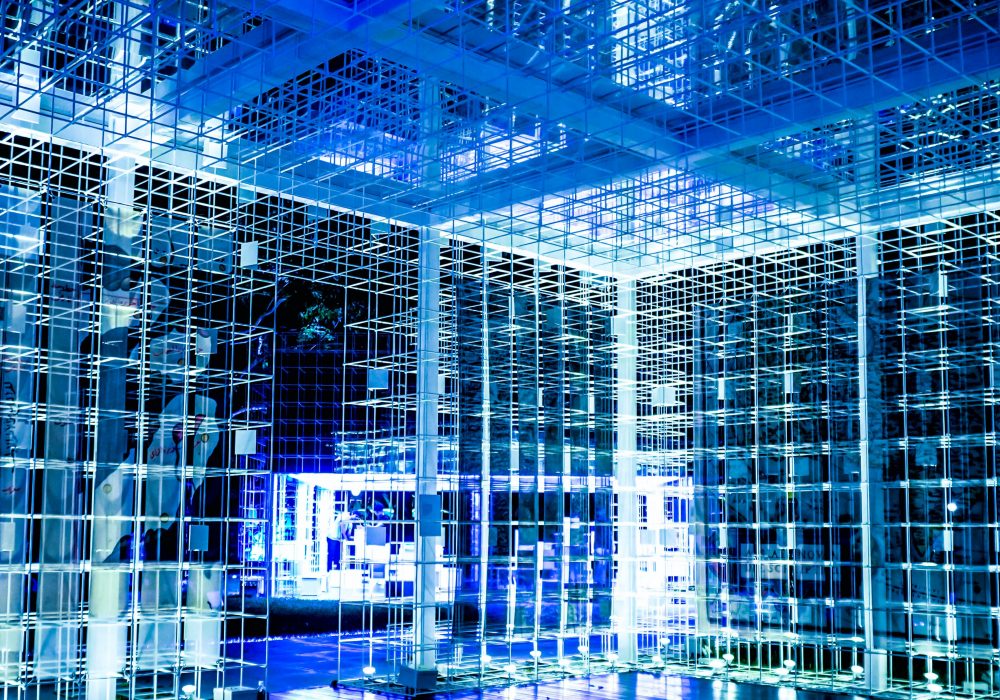Open societies must create a grand strategy framework for data, sensemaking, and trust
James Schmeling is the President and CEO of the National Defense University Foundation and guest co-author of this post alongside Dr. David Bray, the Director of the Atlantic Council’s GeoTech Center.
A video of this discussion is available at the National Defense University’s website and is embedded into this post after the Introduction and first section on “A new imperative and a new hope”.
Table of contents
- A new imperative and a new hope
- Doubling-down on open society values
- Braving the current stormfronts
- Public participation in practices previously kept private
- Conflicts in terms of trade
- Conflicts in terms of information environments
- Conflicts in terms of global governance
- Applying these premises in practice
- References
Introduction
Open societies are at a series of crossroads requiring intentional choices for the decade ahead. These choices are forced by new technologies, improvements in data capabilities, and changes in geopolitics globally. While human nature has not changed, the number of people on Earth has changed–up from 1.6 billion people on the planet in 1900, to 2.5 billion in the 1950s, to 7.8 billion in 2020[1].
The number of networked devices on Earth has changed dramatically, with an estimated 50 billion networked devices on the planet by 2021 – up from 5 billion in 2003 and, more recently, only 25 billion in 2015[2]. The amount of data on the planet has changed too with the amount of data in the world estimated to be 44 billion terabytes in 2020. To put this perspective, this means the ever-growing number of bytes in the “digital universe” is now 40 times more than the number of stars in the observable universe[3].

A new imperative and a new hope
For the United States to thrive amid all these changes, a grand strategy framework is essential. Specifically, a framework focused on data, sensemaking, and trust amid the turbulent changes in technologies, data, and geopolitics.
The US and other like-minded nations represent open societies that value the plurality of different human choices associated with life’s choices of work, family, and living. This means open societies also value human agency and human dignity. As an extension of these values, open societies respect for the freedom of speech, privacy, and intellectually generated work.
Closed societies, in contrast, do not necessarily value a plurality of different human choices associated with life’s choices of work, family, and living. Conformity paired with control may represent higher values. In closed societies, a single narrative exists – often determined by either the state or a religious institution. Those who disagree with this narrative have little recourse and active disagreement risks a loss of employment and property, loss of freedoms and interactions with family, or even loss of life.
In a world driven by technological, data, and geopolitical changes – conflicts have arisen between open vs. closed societies that have been exacerbated by the COVID-19 pandemic. When it comes to the future of conflict between closed and open societies, closed societies do not need to worry about the weaponization of the freedom of speech, privacy, or intellectually generated work in part because such respect is not central to the society’s operations. While these attributes may have value in the closed society, the higher-order supremacy of a single narrative that exercises control over human choices associated with life’s choices of work, family, and living takes priority.
Open societies, on the other hand, may find that their respect for the freedom of speech, privacy, and intellectually generated work can be abused and weaponized against them – to polarize their populations or divide their public and private sectors – through actions either influenced or prompted by a closed society aggressor. Such aggression could occur between humans, between machines on the Internet or other networks, or between humans and machines in either witting or unwitting forms of conflict.
To thrive in a changing world, the US and like-minded nations must create a grand strategy framework for data, sensemaking, and trust. Stakeholders for such a framework includes elected government representatives, executive agencies, military and intelligence agencies, companies in the private sector, non-profit and non-government organizations, as well as international actors who are friends, allies, and partners. The public itself also represents a crucial participatory partner. As such, open societies must find ways to engage the public in processes associated with data, sensemaking, and trust activities lest members of the public become distrustful simply for a lack of involvement.
Developing a successful framework would amplify what the 2018 National Defense Strategy [4] calls with regards to “information experts, data scientists, computer programmers, and basic science researchers and engineers—to use information, not simply manage it.” Members of the defense workforce, uniformed or civilian, and government broadly must understand the provenance of data, the reliability of data, and be able to analyze data, make sense of data, and put data to use or communicate it to those who will make use of it. Moreover, members of the national security community also must find ways to do data activities with people, instead of the legacy methods that were done to people and often hidden behind a curtain. Such participatory defense-related data activities are necessary for open societies in an increasingly connected world.
Doubling-down on open society values
A successful framework for data, sensemaking, and trust would help the US double-down on its open society values, to include valuing human agency, human dignity, the freedom of speech, privacy, and intellectually generated work. Such a framework must be easily understood, accessible, and consumable by the public, to include understanding how data is assessed to create information, who to trust and how to trust is established, and how to evaluate sensemaking by others. Furthermore, such a framework must take account of the features of any open society, where anyone can contribute to the dialogue, and where many seek to insert misinformation and disinformation and to sow distrust, slow both action and reaction, and create an advantage for themselves. It must also seek to understand how misinformation and disinformation spreads whether wittingly or unwittingly, and help the public to understand how and why this happens, what it means to them, and how they can respond to support our national security and their own interests.
It is worth noting that authoritarian regimes may have some advantages in a rapidly changing world – including not having to coordinate across their public and private sectors nor work to build public consensus on their nation direction – open societies have other advantages tied to their valuing different perspectives and insights which have consequentially driven innovation. While an authoritarian government can command its military, people and economy, an open government can tap into the broader population and all sectors to leverage individual and collective strengths in support of its actions.
Organizations like the National Defense University (NDU) and the Atlantic Council both bring together many of these actors to build relationships, capacity, leadership, and perhaps most important, trust. NDU also brings together the US military, the State Department, other government agencies, and foreign nations, along with companies in the private sector focused on national security and defense who send their best to be students and become strategic leaders. The relationships formed transcend boundaries of organizations and governments to enable the human factors important in developing trust. NDU’s vision statement reinforces this notion: “NDU will create strategic advantage by developing joint warfighters and other national security leaders and forging relationships through whole-of-nations and whole-of-government educational programs, research and engagement.”
An open society encourages different perspectives, collective sensemaking approaches, and critical thinking across the military, intelligence, private sector, non-profits, and diplomatic communities alongside finding more participatory ways to involve the public in these efforts as well. This celebration of plurality represents an open society’s distinguishing advantage relative to closed societies. If an open society is willing to double-down on valuing different perspectives, collective sensemaking approaches, and critical thinking, this can be what helps us find new ways of work, collaborating, and thriving in a world changing rapidly by new technologies and data capabilities.
For the United States, the fundamental element that makes its representative democracy work is the plurality of thought which comprises the openness of its societies. This fundamental element of plurality represents the long-term strength in ensuring a future where freedom, human agency, and human dignity are preserved in the future ahead.
All questions of government ultimately come down to “who decides?” Closed societies make this choice for their citizens. Open societies argue about it endlessly, but that’s the point.

Braving the current stormfronts
Actions tied to such a grand strategy framework must be done with the people of the United States and with like-minded nations as well, not behind some darkened curtain. A fruitful, shared future depends on public participation across different communities, especially given the increasing polarization present not just in the US but also in other open societies such as Europe, the United Kingdom, Canada, Australia, and New Zealand. It will be important in strategic power competition for influence in nations which are not yet firmly in the camp of open societies or authoritarian societies.
Such polarization coincides with an increasing lack of trust in data and the narratives surrounding that the interpretation of data into information. Information, misinformation, and disinformation play increasingly important roles in strategic competition, whether with “great powers” Russia and China or nations including Iran and North Korea, or even with state- and non-state-sponsored terror groups.
Two current examples highlight the dramatic challenges that the US faces regarding an increasing lack of trust in data and the narratives surrounding that data. These two issues impact every person living in the US and showcase national security vulnerabilities: COVID-19 and the 2020 national elections.
First, disinformation spread through networks operated by foreign military and intelligence services to sow confusion in the US during the COVID-19 a health emergency may not be well understood by the public. As a result of these disinformation attacks and lack of public understanding as to what they represent, the US is a nation divided with regards to the collective sensemaking of the pandemic. This lack of shared sensemaking further increases the mistrust of government, individual agencies, and public health officials. Such mistrust can become a self-fulfilling prophecy triggered by misinformation: a lack of trust likely hampered efforts to contain the virus and minimize its spread and likely amplified the economic damage caused by the pandemic. These second- and third-order effects were then further exploited by peer- and near-peer competitors intending to prompt further division, polarizing actions, or inactions, among all parts of the United States’ open society.
Second, both elections and election security regulations and processes vary significantly from state to state, from county to county, and among varying election authorities. Election information on the specific processes set in law, and the policy and regulations implementing elections, and data on election fraud are not as well understood by all members of the public. As with COVID, the public’s vantage point lends itself to being polarized and susceptible to manipulation by both domestic and foreign actors. The US intelligence community has indicated election interference attempts were made in 2016, 2018, and are ongoing in 2020 by Russian, by China, and by others, while some downplay the interference as having no impact or no ability to tamper with the electoral process. This controversy is exacerbated by the fact that information gathered by the intelligence community is not fully available to the public, even while the conclusions have been communicated, and particularly when those conclusions are interpreted, given credence, or dismissed by various government officials.
These specific examples represent documented instances of what historically would have been called active measures and organized deception by Russia, China, and other regimes – and are now called misinformation and disinformation, campaigns. These specific examples also represent instances of significant disagreement and action domestically. Yet several other, less documented polarizing wedge issues exist too, where an increasing lack of trust in data and the narratives surrounding that data information challenge the United States too. To mitigate future polarizing wedge issues, the United States must create a grand strategy framework for data, sensemaking, and trust for a world in which new technologies and data capabilities impact geopolitics in ways that are both positive and negative.

Public participation in practices previously kept private
The issues related to national security, intelligence, the technical ways and means of gathering, analyzing, and presenting data; the sensemaking from that data; the trust in the decisions and actions made on that data all represent instances where the general public may not be privy in an open society. While such practices legitimately are required to protect methods and means, to include human lives, this opaqueness represents yet another wedge issue that can be exploited by foreign actors to sow distrust in open societies in ways not possible in more closed regimes.
The national security community knows that the practice of forecasting is difficult. The community does at times discover that in retrospect, that sometimes data sets were wrong. Or that the analysis was incorrect. The so-called “bomber gap” is a good illustration of this error, with estimates of Soviet air power vastly outstripping their actual capabilities leading the US to invest significant resources in competing technologies for counterstrike and defense. Air surveillance imagery by the U-2 eventually demonstrated to the government the reality of Soviet air power, but these images were not made available to the public. Subsequent technical capabilities of air and satellite imagery historically have remained unavailable to the public except rarely wherever focused (e.g., the image of the Iran launch site accident Tweeted by President Trump[5]).
Similarly, the national security community now must estimate the growing naval power of China based on its public statements about shipbuilding, commercial and intelligence photography of shipbuilding, and certain other means of surveillance and intelligence gathering. The national security community of the United States knows much about their area access/area denial capabilities including missiles built to target its expeditionary and naval forces, their focus in the South China Sea, their building artificial islands on reefs that support defenses and aircraft, and their proclaimed advances in hypersonic missiles. At the same time, disclosure of all intel to the public would impair the ability to counter the threats nor can the national security share countermeasures.
While there is no textbook for the era ahead, members of the national security community must find ways to do data activities with people, instead of the legacy methods that were done to people and often hidden behind a curtain. Such participatory defense-related data activities are necessary for open societies in an increasingly connected world. The United States may want to consider the ability for private sector data and technology experts to serve as reservists.
A successful grand strategy for data, sensemaking, and trust must consider the challenges that open societies face relative to authoritarian regimes which, as noted earlier. These challenges include:
- Conflicts in terms of trade
- Conflicts in terms of information environments
- Conflicts in terms of global governance

Conflicts in terms of trade
First, any open society engaged in either competition or intensified conflict with a closed society must consider what are its ideal strategic goals with regards to the interdependencies in terms of trade relative to the closed society – as well as what are the closed societies’ strategic goals on the same issues.
Short of encouraging the closed society to become an open society with similar values as the open society itself – in a conflict situation, winning for an open society means employing a set series of incentives, norms, and actions that encourage the closed society to pursue the same goal as the open society.
When it comes to interdependencies in terms of trade, four possibilities exist:
| Open society overly dependent: Closed society is not that dependent on open society for trade, and the Open society *is* dependent on closed society for trade. | Mutual entanglement: Closed society *is* dependent on open society for trade, and the Open society *is* dependent on closed society for trade. |
| Decoupled: Closed society is not that dependent on open society for trade, and the Open society is not dependent on closed society for trade. | Closed society overly dependent: Closed society *is* dependent on open society for trade, and the Open society is not dependent on closed society for trade. |
At first glance, for the open society, the most desired goal would be a future where the closed society was overly dependent on it for trade – while the open society was not. However, this first glance deserves a second look. Achieving such a scenario would require the economic productivity of the open society to be such that sales, purchases, and overall trade with the closed society were uninfluential to the open society. Depending on the size and scope of the closed society this may not be possible. Moreover, achieving such a scenario would require the open society to fit alternative trading partners to supplement the natural resources, labor, and services that it may have previously received from the closed society.
Achieving a situation where the open society was not dependent on the closed society for trade might require the open society to shrink its own economy and pays its own workers less to compensate for the labor and services previously received oversees. If the open society were to shrink its own economy and pay its own workers less, in an open society this might result in vocalized protests and riots as well as the shifting of corporate activities and intellectually generated work to other more conducive societies.
So, for the open society, while the most desired goal would be a future where the closed society was overly dependent on it for trade and the reverse was not true – this may not be possible or realistic. The more feasible goal would be a situation of mutual entanglement, where both societies are dependent on each other for trade. This does not mean that trade conflicts would not exist, in fact, they probably would continue; however, they would be contained insomuch that both societies’ economies as well as the need for natural resources, labor, and services were mutually entangled in terms of production and delivery.
In contrast, for the closed society, the most desired goal in a conflict would be a future where the open society is overly dependent on it. In contrast to the open society, the closed society may be able to pursue such a future either because of its size and scope – or because of how the closed society controls its internal activities to include its industrial base. Specifically, a closed society may be able to intentionally engineer and insulate its own economy to compensate for the trade it previously received from the open society. Moreover, a closed society pay its own workers less precisely because the closed society does not place primacy on the freedom of speech or intellectually generated work – and thus the closed society can control protests and riots as well as intentionally preclude any shifting of corporate activities and intellectually generated work to other more conducive societies through authoritarian control.
As such, a challenge exists – whereas a closed society can possess a strategic goal of an open society being dependent on them for trade, an open society may not be able to pursue the reverse goal of a closed society being dependent on the open society for trade. If complete “decoupling” is not possible for the open society, given the size and scope of trade associated with the closed society, then a more realistic strategic goal for the open society would be mutual entanglement maintained and preserved between the two societies. Encouraging mutual entanglement requires the open society to have access to data in its own economy and that of the closed society, engage in sensemaking to understand the contours of the possible trade entanglement, and trust data garnered from sources in both societies.
Given all of this, any grand strategy for data, sensemaking, and trust in an open society should seek to employ new technologies and data capabilities to increase the robustness of that open society’s economy and trade capabilities, as well as encourage and motivate the closed society to maintain a mutual entanglement with the open society.

Conflicts in terms of information environments
Third, any open society engaged in either competition or intensified conflict with a closed society must consider the interdependencies in terms of global governance institutions, norms, and activities relative to the closed society – as well as the closed societies’ strategic goals on the same issues.
As aforementioned, global governance institutions, norms, and activities include the existing supranational institutions created post-World War II, to include the United Nations, the North Atlantic Treaty Organization, World Bank, International Monetary Fund, the World Trade Organization, Group of Twenty (G20), and the International Criminal Court. Efficacy of these different organizations varies and it could be that some of these institutions are insufficient for addressing the challenges of the 2021 and beyond – especially if, as already demonstrated for both conflicts involving trade and conflicts involving information environments, open societies should seek to switch from conceptualizing the society as defined by geography to a society defined by intentional cues, behaviors, and attestations, akin to a global network.
Current imperatives underscore the critical need to expand access to education in cybersecurity, emerging and disruptive technologies, and information for our nation’s cyber workforce across all industries.
Most of the post-World War II global governance institutions and norms are still nation-state centric, and woefully unprepared for both what advances in new technologies and data capabilities make possible. When considering conflicts, strategic goals, and interdependencies in terms of governance – both open and closed societies may find the motivation to create wholly new global governance institutions, norms, and activities.
When it comes to interdependencies in terms of governance, four possibilities exist:
| Open society in check: Closed society is not that influenced by global governance institutions more supportive of the open society’s norms and activities, and the Open society *is* influenced by global governance institutions more supportive of the closed society’s norms and activities. | Mutual entanglement: Closed society *is* influenced by global governance institutions more supportive of the open society’s norms and activities, and the Open society *is* influenced by global governance institutions more supportive of the closed society’s norms and activities. |
| Decoupled: Closed society is not that influenced by global governance institutions more supportive of the open society’s norms and activities, and Open society is not that influenced by global governance institutions more supportive of the closed society’s norms and activities. | Closed society in check: Closed society *is* influenced by global governance institutions more supportive of the open society’s norms and activities, and the Open society is not influenced by global governance institutions more supportive of the closed society’s norms and activities. |
Again, as with trade and with information environments, it might initially appear that for the open society, the most desired goal would be a future where the closed society was influenced by global; governance institutions more supportive of the closed society’s norms and activities – while the open society is not influenced by global governance institutions more supportive of the closed society’s norms and activities. Yet here the open society faces the dilemma somewhat akin to the dilemma posed by with information environments in open societies. To inure itself to the global governance institutions more supportive of the closed society’s norms and activities, the open society will have to lose a degree of openness – effectively becoming an open society to everyone but that one or all closed societies.
Moreover, an open society seeking to keep a “closed society in check” risks legitimizing any actions the closed society does to close itself and its population from the open society. Furthermore, the open society risks motivating the closed society to seek other societies to form a completely new set of global governance institutions, norms, and activities. Closed societies, or societies seeking the benefits of being a closed society, may rally together to create global governance institutions distinct from those support of open societies.
So, for the open society, while the most desired goal would be a future where the closed society was influenced more overly by global governance institutions more supportive of the open society’s norms and activities – this may not be possible or realistic. As with trade and information environments, the more feasible goal would be a situation of mutual entanglement, where both societies are influenced by each other’s supportive governance activities. Or even that the same global governance activities produce an influence interdependence between both societies. This does not mean that governance-related conflicts would not exist, in fact they probably would continue; however, governance-related conflicts are preferred to detrimental conflicts or all-out wars.
In contrast, for the closed society, the most desired goal in a conflict would be a future where the open society is overly influenced by global governance institutions more supportive of the closed society’s norms and activities. In this scenario, the closed society may not have as easy a time in achieving this as it would with regards to trade or information environments. First, the closed society is essentially closed, meaning its efforts to assemble a base of allies would require the assembling of allies either through shared values of closeness or shared dependence with regards to trade or information environments.
For a closed society, assembling a base of allies through shared values or shared dependence might be more likely if an open society neglected its own efforts to assemble allies with shared values of openness. A closed society in conflict with an open society attempting to “go it alone” might be able to paint the open society as out of control, a bully, not one that other societies should align with, and rogue.
If however, an open society does not go it alone, and actively works to recruit allies through shared values and interdependence (vs. dependence, because dependence may backfire for an open society assembling allies who may become resentful) with regards to trade or information environments – then attempting to produce a future where the open society is overly influenced by global governance institutions more supportive of the closed society’s norms and activities may be quite difficult.
It is in this difficulty posed for closed societies seeking to build influential governance activities that an open society may have an advantage and the opportunity to influence the closed society to have the shared goal of mutual entanglement, where both societies are influenced by global governance activities. As noted earlier, short of encouraging the closed society to become an open society with similar values as the open society itself – in a conflict situation, winning for the open society ideally would entail a series of incentives, norms, and actions that encourage the closed society to pursue the same goal as the open society. Consequentially, when it comes to conflicts, strategic goals, and interdependencies in terms of governance – an open society can win if it assembles more allied global governance activities supportive of its efforts. A closed society can win if it discourages allies to assemble to support an open society.
Given all of this, any grand strategy for data, sensemaking, and trust in an open society should seek to employ new technologies and data capabilities both to increase the robustness of global governance institutions more supportive of that open society’s norms and activities with a specific focus on assembling allies with shared values and focus. Through these actions, the open society can effectively encourage and motivate the closed society to maintain a mutual entanglement with the open society.

Conflicts in terms of global governance
Third, any open society engaged in either competition or intensified conflict with a closed society must consider the interdependencies in terms of global governance institutions, norms, and activities relative to the closed society – as well as the closed societies’ strategic goals on the same issues.
As aforementioned, global governance institutions, norms, and activities include the existing supranational institutions created post-World War II, to include the United Nations, the North Atlantic Treaty Organization, World Bank, International Monetary Fund, the World Trade Organization, Group of Twenty (G20), and the International Criminal Court. Efficacy of these different organizations varies and it could be that some of these institutions are insufficient for addressing the challenges of the 2021 and beyond – especially if, as already demonstrated for both conflicts involving trade and conflicts involving information environments, open societies should seek to switch from conceptualizing the society as defined by geography to a society defined by intentional cues, behaviors, and attestations, akin to a global network.
Most of the post-World War II global governance institutions and norms are still nation-state centric, and woefully unprepared for both what advances in new technologies and data capabilities make possible. When considering conflicts, strategic goals, and interdependencies in terms of governance – both open and closed societies may find the motivation to create wholly new global governance institutions, norms, and activities.
When it comes to interdependencies in terms of governance, four possibilities exist:
| Open society in check: Closed society is not that influenced by global governance institutions more supportive of the open society’s norms and activities, and the Open society *is* influenced by global governance institutions more supportive of the closed society’s norms and activities | Mutual entanglement: Closed society *is* influenced by global governance institutions more supportive of the open society’s norms and activities, and the Open society *is* influenced by global governance institutions more supportive of the closed society’s norms and activities |
| Decoupled: Closed society is not that influenced by global governance institutions more supportive of the open society’s norms and activities, and the Open society is not that influenced by global governance institutions more supportive of the closed society’s norms and activities | Closed society in check: Closed society *is* influenced by global governance institutions more supportive of the open society’s norms and activities, and the Open society is not influenced by global governance institutions more supportive of the closed society’s norms and activities |
Again, as with trade and with information environments, it might initially appear that for the open society, the most desired goal would be a future where the closed society was influenced by global; governance institutions more supportive of the closed society’s norms and activities – while the open society is not influenced by global governance institutions more supportive of the closed society’s norms and activities. Yet here the open society faces the dilemma somewhat akin to the dilemma posed by with information environments in open societies. To inure itself to the global governance institutions more supportive of the closed society’s norms and activities, the open society will have to lose a degree of openness – effectively becoming an open society to everyone but that one or all closed societies.
Moreover, an open society seeking to keep a “closed society in check” risks legitimizing any actions the closed society does to close itself and its population from the open society. Furthermore, the open society risks motivating the closed society to seek other societies to form a completely new set of global governance institutions, norms, and activities. Closed societies, or societies seeking the benefits of being a closed society, may rally together to create global governance institutions distinct from those support of open societies.
So, for the open society, while the most desired goal would be a future where the closed society was influenced more overly by global governance institutions more supportive of the open society’s norms and activities – this may not be possible or realistic. As with trade and information environments, the more feasible goal would be a situation of mutual entanglement, where both societies are influenced by each other’s supportive governance activities. Or even that the same global governance activities produce an influence interdependence between both societies. This does not mean that governance-related conflicts would not exist, in fact they probably would continue; however, governance-related conflicts are preferred to detrimental conflicts or all-out wars.
In contrast, for the closed society, the most desired goal in a conflict would be a future where the open society is overly influenced by global governance institutions more supportive of the closed society’s norms and activities. In this scenario, the closed society may not have as easy a time in achieving this as it would with regards to trade or information environments. First, the closed society is essentially closed, meaning its efforts to assemble a base of allies would require the assembling of allies either through shared values of closeness or shared dependence with regards to trade or information environments.
For a closed society, assembling a base of allies through shared values or shared dependence might be more likely if an open society neglected its own efforts to assemble allies with shared values of openness. A closed society in conflict with an open society attempting to “go it alone” might be able to paint the open society as out of control, a bully, not one that other societies should align with, and rogue.
If however, an open society does not go it alone, and actively works to recruit allies through shared values and interdependence (vs. dependence, because dependence may backfire for an open society assembling allies who may become resentful) with regards to trade or information environments – then attempting to produce a future where the open society is overly influenced by global governance institutions more supportive of the closed society’s norms and activities may be quite difficult.
It is in this difficulty posed for closed societies seeking to build influential governance activities that an open society may have an advantage and the opportunity to influence the closed society to have the shared goal of mutual entanglement, where both societies are influenced by global governance activities. As noted earlier, short of encouraging the closed society to become an open society with similar values as the open society itself – in a conflict situation, winning for the open society ideally would entail a series of incentives, norms, and actions that encourage the closed society to pursue the same goal as the open society. Consequentially, when it comes to conflicts, strategic goals, and interdependencies in terms of governance – an open society can win if it assembles more allied global governance activities supportive of its efforts. A closed society can win if it discourages allies to assemble to support an open society.
Given all of this, any grand strategy for data, sensemaking, and trust in an open society should seek to employ new technologies and data capabilities both to increase the robustness of global governance institutions more supportive of that open society’s norms and activities with a specific focus on assembling allies with shared values and focus. Through these actions, the open society can effectively encourage and motivate the closed society to maintain a mutual entanglement with the open society.

Applying these premises in practice
For the United States, the Secretary of Defense and the Chairman of the Joint Chiefs have mandated that senior Joint Professional Military Education curricula focus 50 percent on the threat of China, including China as a nuclear power, economic competitor, and as a cyber, space, and conventional competitor. In telecommunications, and particularly in 5G, the United States government has made clear to the public that they believe the Chinese Communist Party is able to leverage its nation’s commercial entities to gather intelligence and intellectual property by providing critical telecom infrastructure worldwide at unbeatable pricing that cannot be matched by the competition of other global, private sector companies not backed by China.
Unencumbered societies may have a data advantage. On one hand, China can unilaterally collect information, with the collaboration of its commercial technologies, to build data set algorithms. This is an example of how these algorithms are applied to national security, understanding human behavior, and how they may outpace open societies in these capabilities. On the other hand, open societies with exposure to the data, to the collection methods, to the analytic processes, may improve on the processes and algorithms applied to enhance decision making.
Future senior decision makers will utilize skills acquired through NDU to guide our national security and contribute to the grand strategy of a future framework.
Given these difficult realities facing open societies, the United States needs a grand strategy framework on data, trust, and sensemaking. Such a grand strategy framework would account for not only the strengths of being an open society but also the limitations as well. Such a framework would also need to account for the threats posed by foreign actor’s access to global information environments, universities, and the US public.
A grand strategy framework could also recognize the essentialness of:
- First, transparent development of goals, outcomes, and techniques associated with dynamic flows of data, sensemaking, and trust-confirming actions associated with trade, information environments, and global governance activities. These goals, outcomes, and techniques—will also specify standards for the ethical data practices, pluralistic approaches to sensemaking in turbulent and potentially deceptive and disruptive environments, and how dynamic trust-confirming actions associated with global governance activities will operate.
- Second, technologies and data ventures that support instrumenting actions over time in such a way that ethical collection of, sharing of, and decision-making linked to intentional cues, behaviors, and attestations support public involvement in data, sensemaking, and trust-confirming processes an open society. Such ventures should support independent mechanisms to help validate and verify consistent application of ethical processes to instrumenting actions over time to avoid becoming persistent surveillance or hiding the surveillance from the public.
- Third, education needs to be done to inform members of the public, members of the private sector, and stewards in the public sector on the benefits and risks that result in shifting to societies operating like global networks defined by intentional cues, behaviors, and attestations. Such a change is dramatic and will only succeed if the multiple non-traditional stakeholders of national security are involved alongside elected government representatives, executive agencies, military, and intelligence agencies, companies in the private sector, non-profit and non-government organizations, as well as international actors who are friends, allies, and partners. This is to support inclusion and support a diversity of perspectives associated with the shift, as well as intentionally avoid the concentration of too much power in too few a set of actors that might slip into persistent surveillance, total control, or singular narratives in an era of significant technological changes.
It is worth noting that such a grand strategy framework also could be employed by fellow like-minded nations for their mutual endeavors as well. Furthermore, premier entities like the Atlantic Council, which emphasize the importance of being “strong with allies” both across nations and sectors – alongside National Defense University, where the best members of the joint forces are combined with whole-of-government and whole-of-nation stakeholders to focus on national security — might represent the best place for the development of such a grand strategy framework and permit those who will become senior leaders to think, to write, and to interact with those who will collaboratively build this framework in the next phases of their careers. The National Defense University Foundation brings resources and collaboration to NDU, its students, faculty, and partners including international friends, partners, and allies, providing the margin of excellence necessary to our national security. Collaboration with think tanks such as the Atlantic Council extends that margin of excellence to thought leadership and provide opportunities to engage in strategic thought during a last professional military education experience prior to promotion to the senior most levels of government, where policy choice and implementation are set to impact whole of government and whole of nation activities related to national security.
References:
[1] https://www.worldometers.info/world-population/world-population-by-year/
[2] https://www.statista.com/statistics/678739/forecast-on-connected-devices-per-person/
[3] https://seedscientific.com/how-much-data-is-created-every-day/
[4] https://dod.defense.gov/Portals/1/Documents/pubs/2018-National-Defense-Strategy-Summary.pdf
[5] https://twitter.com/realDonaldTrump/status/1167493371973255170/photo/1

The GeoTech Center champions positive paths forward that societies can pursue to ensure new technologies and data empower people, prosperity, and peace.


